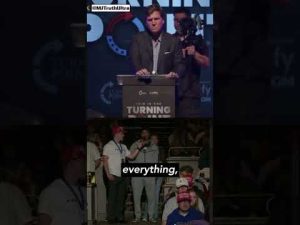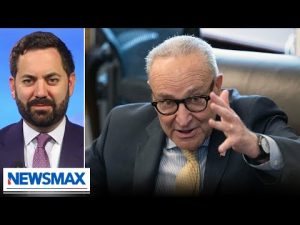**Chaos Meets Clownery: The Ongoing Saga in Illinois Politics**
In the political theater of Illinois, where the drama often rivals that of a circus, the spotlight recently fell on Governor J.B. Pritzker and his fervent defenders. During a recent interview with Rachel Matto, Pritzker’s responses were met with skepticism and sharp critique. Critics questioned his ways, particularly his incendiary comparisons that echoed the rhetoric of the Nazi SS. The awkwardness of such analogies did not go unnoticed, especially as the governor, being Jewish himself, was accused of trivializing a horrific event while still standing firmly within the Democratic Party.
Mark, a commentator at the scene, took the opportunity to castigate those who align with the current Democratic leadership. He highlighted what he described as a troubling trend: a party that allows its members to use egregious propaganda without much accountability. From Pritzker’s financial background as a trust fund baby to his lofty ambitions of presidency, Mark painted a picture of a leader who has bought his way into politics, leaving the concerns of everyday Illinoisans—especially those in troubled Chicago—bleeding on the floor.
As the conversation delved deeper, the topic of militarization arose. The insinuation that former President Donald Trump aimed to militarize cities, to supposedly control future elections, was thrown around like confetti. But Mark countered with a bold rebuttal: the people of Chicago are not under military rule; rather, they are clamoring for law and order amidst rising crime. With a mayor boasting a popularity rate akin to that of a soggy sandwich, many feel abandoned, waiting for someone to restore peace and safety to their neighborhoods.
Drawing historical parallels, Mark recalled past presidential actions where military force was employed to restore order. From Eisenhower’s intervention in Little Rock to the response during the Watts riots, he suggested that such actions are not new in American history; they are often a necessary response to chaos. However, Pritzker’s administration, he argued, seems reluctant to take decisive action. Instead, they choose to brandish accusations at the federal level when the real story is the failure of local governance.
Diving headfirst into immigration issues, Mark pointed to the relative tranquility in red states like Florida and Texas, claiming there’s a stark contrast in management of immigration crises. He suggested that understanding law enforcement’s cooperation with federal authorities in these states is key to their success. Why, he pondered, do conflicts only seem to erupt in blue areas like Illinois while states governed by Republicans flaunt a smoother operation amidst migrant challenges? The governor, Mark proclaimed, lacks the backbone to face these issues head-on.
In this swirling maelstrom of accusations and counterpoints, one thing stands clear: Illinois politics is a circus, and Pritzker, with his over-the-top drama, is perhaps the ringleader. But as the clowns of politics keep the audience engaged with their antics, the pressing issues of safety, governance, and accountability loom larger each day. While one may laugh at the absurdity unfolding on the stage, the real tragedy is the lives affected by these political performances.







